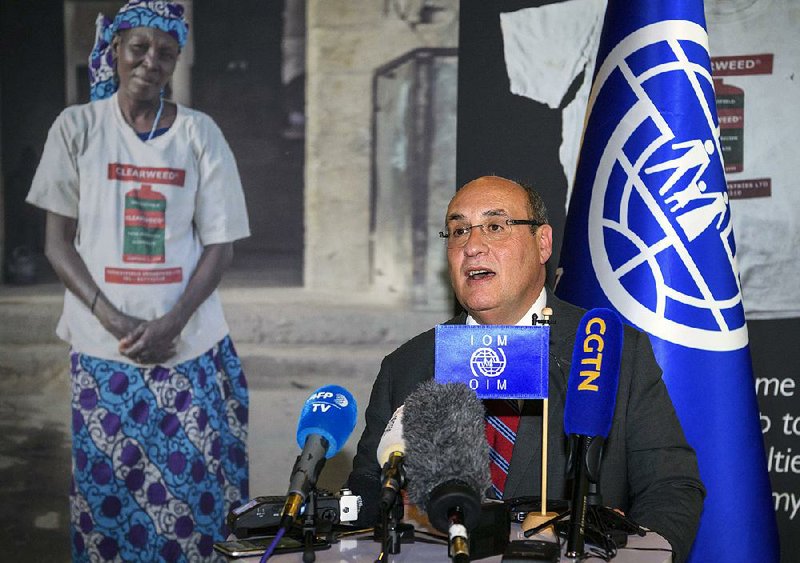GENEVA -- The U.N.'s migration agency on Friday snubbed the United States' candidate to lead it, a major blow to U.S. leadership of a body addressing one of the world's most pressing issues -- and only the second time that it won't be run by an American since 1951.
Portuguese Socialist and former European Union Commissioner Antonio Vitorino won a race to be the next director general of the International Organization for Migration, edging out both a top agency official and U.S. candidate Ken Isaacs, the body said in a statement.
Vitorino, 61, will become the group's second director general not from the U.S. since the intergovernmental organization was founded. He is a former European Union commissioner for Home and Justice Affairs who has been president of the Notre Europe think tank for the past seven years, and is considered very close to U.N. Secretary-General Antonio Guterres, also a Portuguese Socialist early in his political career.
Isaacs was eliminated in early rounds of voting, and Vitorino won by acclamation over runner-up Laura Thompson of Costa Rica, currently an agency deputy director general who was vying to become the agency's first woman chief.
The move comes as President Donald Trump's administration has been retreating from or rebuffing international institutions, including two others based in Geneva: Earlier this month, the United States pulled out of the U.N.'s Human Rights Council, and Trump has recently criticized the World Trade Organization as "unfair" to the U.S.
"Yet another sign that US power, authority and prestige has been so dramatically diminished," tweeted Keith Harper, who was the ambassador to the rights council under President Barack Obama. The "[International Organization for Migration] Director is seen as an 'American seat' and Trump was unable to place an American in it."
The U.S. State Department congratulated Vitorino, calling the vote "a very competitive election with three highly qualified candidates."
"[International Organization for Migration] is an important partner for the United States around the globe, and we are committed to working with [International Organization for Migration] to address root causes of migration and to promote safe and legal migration," it said in a statement.
Isaacs' candidacy had been clouded by U.S. policies such as travel bans and migrant family separations, and his own comments that critics have called anti-Muslim. But few diplomats streaming out of a Geneva conference center dared to offer an explanation about how an American was stripped of a post that the U.S. has held a lock-hold on for decades.
One, Senegalese diplomat Youssoupha Ndiaye, simply spoke of the early result: "The American is out."
Vitorino, who was selected by the dues-paying, ballot-casting members among the 172 countries in the agency, will succeed longtime U.S. diplomat William Lacy Swing, who leaves in September.
An intergovernmental body that became a U.N.-related agency in 2016, the International Organization for Migration has had only one director general who wasn't American since its creation 67 years ago.
But Mark Hetfield, a self-described friend of Isaacs who heads the humanitarian group HIAS, which works with the migration agency, put the blame on policies and invective from the man in the White House, not the candidate for the job.
"This [International Organization for Migration] election really was not about Ken Isaacs, for whom I have a lot of respect as a humanitarian," Hetfield said. "The election was an international referendum rejecting President Trump and his xenophobic, Islamophobic and isolationist policies."
"Let's face it, Isaacs' tweets were no worse than the ones coming out of the White House," he added.
The administration is fresh off major international scorn over the separation of families coming across the Mexico border. The U.S. Supreme Court has also upheld Trump's ban on U.S. travel for citizens of a number of countries, most of them predominantly Muslim.
Trump has also yanked the United States out of the Global Compact for Migration -- a fact that several diplomats, who requested anonymity because they were not authorized to speak on the record about the balloting, cited as a worrying sign about U.S. policies on an issue that has vast implications around the world.
Isaacs himself had been on the defensive over retweets and other social media comments that some critics viewed as anti-Muslim, so much so that he shut down his Twitter account. After that, he carefully stage-managed his media appearances and kept to script, with State Department handlers advising him or in tow.
The migration agency has over 10,000 staff members in offices in more than 150 countries. Its work includes providing humanitarian aid to migrants and helping track the deaths of migrants in the Mediterranean Sea. It also helps to resettle migrants accepted by foreign countries -- and at times return them home.
A Section on 06/30/2018
